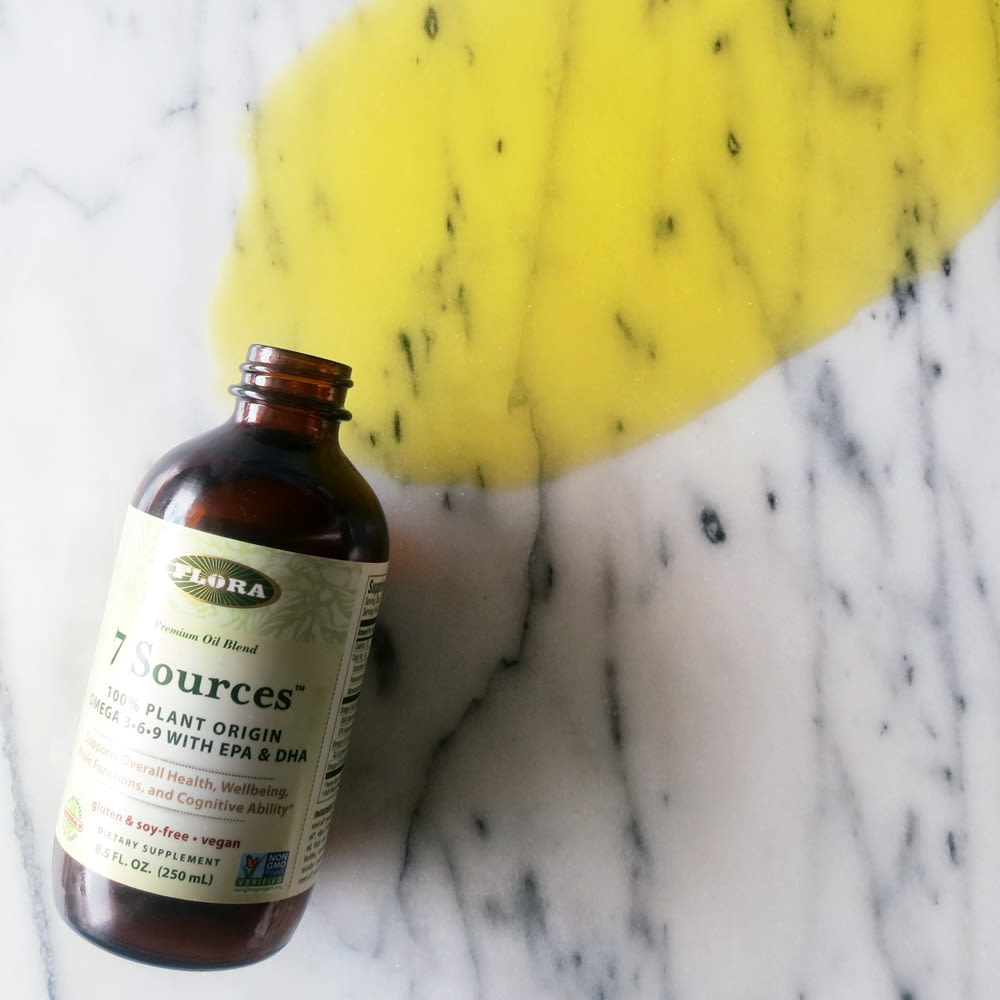I came across the superpowers of omega fatty acids in a really desperate way. Among the many annoying side effects of PCOS (irregular periods, excessive hair growth, acne), the real kicker for me was vaginal dryness. I had just run out of my favorite aloe vera-based lubricant when I took to Google in defeat. While searching for natural ways to increase hydration all over, when I came across sea buckthorn oil on Amazon. In addition to leaving the product five stars, one reviewer felt compelled to share that “Today was the first day I had intercourse since using and when I TELLLLLLL YOUUUUUU It did its job. My partner never came that fast. It was very Very very enjoyable. I’m still having flashbacks of it.” Who was this self-assured and well-lubricated woman? How could I get on her level?
A few days for Prime shipping and eight capsules later, I was just as hydrated as promised. That’s when I started wondering what else omegas could do for me, especially in the dead of winter. Research shows that in addition to omega-7, omegas 3, 6, and 9 offer cardiovascular and brain health benefits, reduce inflammation, as well as lubricate joints and help regulate hormones. Plus, about 95-percent of American women of child bearing age are not getting their recommended daily serving of omegas. We’re missing out, big time! So let’s go through all the omegas now, starting with…
Omega-3
Where it’s found: flaxseeds, walnut, fatty, fresh-water fish
What it does: prevent clogged pores, support hair growth, aid blood circulation
How you can reap the benefits: diet + supplements
Our bodies cannot produce omega-3—the skin clearing omega largely found in fish—so it has to come from diet. “When we have a lack of oils in our diet, the oil our skin produces tends to be waxy and hard,” Sofie Pavitt, a NY-based facialist, explains. Pavitt says she can often spot a vegan by the textured, bumpy congestion (or non-inflamed acne) caused this hardened oil. Aside from skin health as praised by Pavitt, fish oil is also a big player in hair growth—studies have shown it can help improve hair thickness and density, and can help keep hair in its growing phase for longer.
We can get omega-3s from plants, (superseeds, flaxseeds, chia, hemp, and nuts like walnuts and macadamia are good sources) cold water fatty fish like salmon, mackerel, oysters, and canned anchovies are even better. Two to three servings a week is recommended, but if you’re not into fish, a supplement is a good option. Pavitt’s pick is Vitamedica, a pharmaceutical-grade fish oil molecularly distilled for increased stability and decreased mercury. If you truly don’t want to consume animal products, try flax and chia oils, and avoid algae, chlorella and spirulina, which contain large amounts of skin-inflaming iodine. While some DIYers have attempted to massage fish oil into their hair, you’re still better off with an ingested supplement.
Omega-6
Where it’s found: black currant seed, borage seed, and evening primrose oil
What it does: reduce the risk of heart disease, lower cholesterol, improve insulin sensitivity, soothe skin, control sebum to prevent breakouts
How you can reap the benefits: diet + topical skincare products
Like omega-3’s, omega-6’s contain heart-healthy unsaturated fat that has been credited with reducing the risk of heart disease, lowering LDL “bad” cholesterol levels, and raising “good” HDL cholesterol levels. It’s game player here is linoleic acid, which studies have shown helps improve insulin sensitivity. Just be careful to maintain a balance between omegas-6 and 3—vegetable, corn, and soybean oils, though rich in omega-6, are also high in saturated fat and can cause inflammation. A little bit in moderation is the way to go. Topically, omega-6 is anti-inflammatory, and helps retain moisture and improve elasticity of the skin.
Omega-7
Where it’s found: sea buckthorn berry oil and macadamia nuts
What it does: moisturize everything from the inside out, protect skin from free radicals
How you can reap the benefits: supplements + topical skincare products
Omega-7 is well-known for its hydrating powers, both internally and topically. Most commonly listed as palmitoleic acid, omega-7 nourishes and rejuvenates the skin by protecting your mucous membranes (from your throat to vagina to digestive tract). It aids in collagen production for improved skin elasticity, and boosts moisture for skin, hair and nails. For these reasons, omega-7 has actually been dubbed the beauty omega.
Sea buckthorn berry oil, which comes from a shrub native to coastal areas of Asia and Europe, has the highest concentration of omega-7 and has long been a star in traditional medicine. Rich in antioxidants, sea buckthorn oil also protects the skin of free radicals caused by stress, smoking and environmental pollution when you apply it topically.
Omega-9
Where it’s found: olive oil, nut oils, poultry fat, lard
What it does: aid in cholesterol and heart health, helps the body build strong skin, hair, and nail cells
How you can reap the benefits: diet + topical skin care products
The last of the group, omega-9, has the same heart-healthy and cholesterol fighting benefits as 3 and 6. It also protects against arthritis. The most well-known omega-9 fatty acid, oleic acid, is found in almond, cashew, and avocado oils, and may help increase energy and enhance your mood. Topically, oleic acid-rich oils keep skin moisturized and, because it’s anti-inflammatory, can help ailments such as psoriasis and rosacea. However, because they’re on the richer side, omega-9 isn’t the best topical for those with acne.
—Caroline Dweck
Photo via ITG

